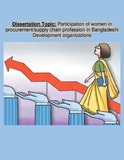| dc.contributor.advisor | Arifuzzaman, S. M. | |
| dc.contributor.author | Munir, M Sirajam | |
| dc.date.accessioned | 2016-09-20T07:04:06Z | |
| dc.date.available | 2016-09-20T07:04:06Z | |
| dc.date.copyright | 2016 | |
| dc.date.issued | 2016-07-16 | |
| dc.identifier.uri | http://hdl.handle.net/10361/6426 | |
| dc.description | This dissertation is submitted in partial fulfillment of the requirements for the degree of Masters in Procurement and Supply Management, 2016. | en_US |
| dc.description | Cataloged from PDF version of thesis report. | |
| dc.description.abstract | Although the survey findings, expert interviews and secondary data do not substantially prove that there is sufficient participation of women in procurement/supply chain profession in Bangladeshi development organizations, the participation of women in this profession appears to be higher in comparison with for-profit and government organizations. Hence, the null hypothesis cannot be accepted provided that the research findings sufficiently indicate that there is not enough female in procurement profession in Bangladeshi development organizations. In addition, the secondary data and expert interviews also indicate that women often do not hold the managerial and higher level positions in the context of Bangladeshi development organizations.
This is a problem identification and exploratory research in nature. The research was very heavily reliant on the primary data analysis. A survey was conducted based on the set research objectives. A total of 41 respondents provided their inputs and comments in the survey other the period of three months which formed the basic building block for the hypothesis testing. The researcher also conducted three expert interviews with the three prominent gender and Human Resources experts to validate and elaborate the findings from the surveys. In addition, two cases relating to the barrier to entry and gender stereotype were used to validate and elaborate the findings from surveys and expert interviews. The secondary data was reviewed and analyzed based on the participation of female labor force in the global context, participation of female labor force in the Bangladeshi contexts and Bangladesh Gender Statistics of 2012. Hence, the research triangulated different types of findings from primary and secondary data.
Secondary data analysis indicate that Bangladesh has a high rate of labor force increase per year for the inclusion of female work force. However, female workforce is far behind in comparison to the accomplishment of higher degrees in comparison with the male work force. In addition, participation of female in administrative and professional positions is very low in Bangladesh. Globally, women are more likely to participate in the more informal and less paid jobs in comparison with male counterparts. Early marriage is an important reason why many women do not complete higher education and participate in the management positions in Bangladesh. Women in Bangladesh are more likely to participate in the flexible and irregularly paid jobs as they might need more time for the household works. This does not help women to participate in specialized positions.All the survey respondents have at least bachelors/BA degree. Hence, It is expected that the procurement/supply chain professionals will be highly educated. The survey results indicate that participation rate of female procurement professional as whole is low (12.10%) in comparison with male. However, participation of female in the development organizations is much higher (29.73%) in comparison with the other types of organization. Gender experts suggested that participation of women can be improved further by increasing the skills sets for this profession and allowing higher education. Most of the survey respondents (85.12%) thought that participation of women in procurement/supply chain profession is low in Bangladesh. Most of the survey respondents disagreed that male could be more effective and efficient in the procurement/supply chain profession in comparison with the female. Most of the survey respondents agreed that there are challenges for women to participate in the procurement/supply chain profession. The experts also mentioned that there are perceived challenges for the female procurement/supply chain professionals.
Most of the respondents thought that employees prefer male over female. This fact was further verified through a case study and review of some of the recently published job announcements for the procurement/supply chain professions. It was observed that many organizations actually restricted their jobs only for the male applicants. Experts indicated reasons such as support services, patriarchal attitude, lack of relevant skills, lack of negotiation skills and stereotype mentality as the general challenges for women to participate in procurement/supply chain profession in the context of Bangladesh. Most of the survey respondents thought that more training and flexibility will allow female to participate in this profession. Experts mentioned that there is scope for the capacity building in this profession. | en_US |
| dc.description.statementofresponsibility | M Sirajam Munir | |
| dc.format.extent | 83 pages | |
| dc.language.iso | en | en_US |
| dc.publisher | BRAC University | en_US |
| dc.rights | BRAC University dissertation reports are protected by copyright. They may be viewed from this source for any purpose, but reproduction or distribution in any format is prohibited without written permission. | |
| dc.subject | Women in procurement | en_US |
| dc.subject | Supply chain | en_US |
| dc.subject | Supply chain education | en_US |
| dc.subject | Formal procurement | en_US |
| dc.title | Participation of women in procurement/supply chain profession in Bangladeshi development organizations | en_US |
| dc.type | Thesis | en_US |
| dc.contributor.department | BRAC Institute of Governance and Development | |
| dc.description.degree | M. Procurement and Supply Management | |

